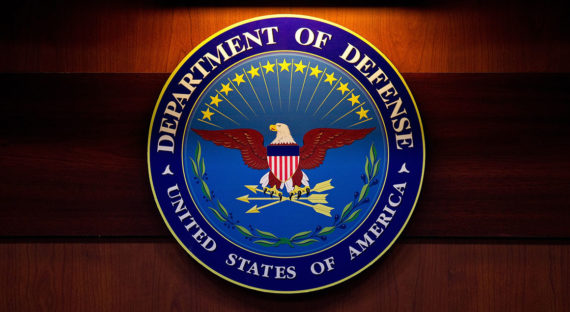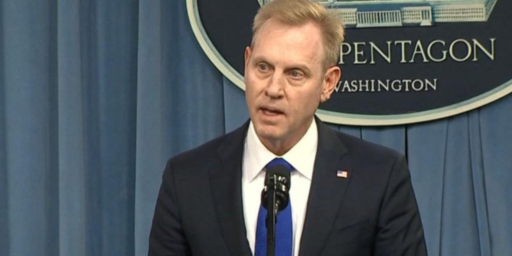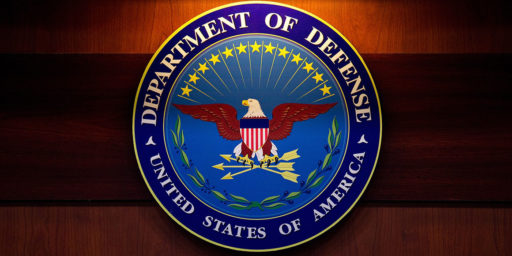Six Months Without a SECDEF
The Pentagon has been headed by Acting Secretaries for an unprecedented period. Does it really matter?

CNN’s Michael Warren is echoing a concern long held by national security wonks: a leadership vacuum at the top of the Defense Department.
When the defense ministers of NATO countries meet in Brussels this week, there will be a notable absence: a Senate-confirmed, permanent United States Secretary of Defense.
The acting secretary and expected permanent nominee, Mark Esper, will be there, just as he was present at the White House last week as President Donald Trump and his national security team deliberated launching a military strike against Iran. But it’s not the same.
An acting defense secretary lacks the political capital and internal confidence of a permanent one. The Senate confirmation vests a secretary with explicit and implicit powers — from the ability to recruit and set long-term policies in the Pentagon to the power to communicate authoritatively with foreign counterparts and members of Congress.
— “A record-long lack of permanent leadership at the Pentagon is starting to take a toll“
This view is one I’ve seen expressed frequently by defense experts I follow on Twitter. But I’m not sure I buy it.
This absence was on full display last week as the President mulled striking Iran, ultimately pulling back at the very last minute. Though Esper was in the room, along with his predecessor Patrick Shanahan, who served as acting secretary from more than six months before stepping down over the weekend, neither was in position to play what several experts and former Pentagon officials say is the crucial role of a Defense secretary — to reconcile the goals and agenda of the administration with the realities presented by the military.
The Trump administration’s Iran policy is a hot mess. Maybe it would be better if Jim Mattis were still SECDEF and commanded the President’s respect. But why would a Senate-confirmed Shanahan have any more sway with President Trump than Acting Secretary Shanahan? Either the Commander-in-Chief values his opinion or he doesn’t.
“It’s just not good. You want to have a fully empowered Secretary of Defense,” Eric Edelman, the former under secretary of Defense for policy in the George W. Bush administration, told CNN. “You need to have a civilian perspective, one that brings some political sense.”
A civilian advisor with political sense is indeed a valuable commodity. But, again, either Shanahan brought that or he didn’t. Why would Senate confirmation boost his civilian-ness or his political acumen?
There hasn’t been a permanent, Senate-confirmed Secretary of Defense since James Mattis resigned from the position on December 31 — a record amount of time for the Pentagon to go without a leader.
Compounding that, the Department is in the midst of an unprecedented period of leadership turmoil. Esper is rapidly being briefed on the complex responsibilities of the acting secretary. But thanks to federal vacancy law, Esper will have to step down as acting secretary once he is formally nominated for the permanent position.
When that happens, the Secretary of the Navy, Richard Spencer, is likely to become the new acting secretary and will have to go through a similar training regimen — only to hold the acting job for the brief time before Esper would be expected to be confirmed by the Senate.
The prospect of three acting secretaries of defense within a few weeks could have been avoided had the President acted more quickly to nominate either Shanahan or a different candidate for the top job. Instead, the Pentagon has been in a period of leadership limbo for half a year.
So, the lack of continuity is indeed a legitimate concern. But, for virtually all of the period in question, Shanahan was filling Mattis’ shoes. And we’d be going through the Shanahan-Esper-Spencer shuffle even if Shanahan had been confirmed by the Senate, since Shanahan would have resigned his post, anyway, for the same reasons.
Here, though, Warren and other critics have a valid point:
This is not to say that the Pentagon can’t function without permanent civilian leadership. The Defense Department consists of massive, largely self-sustaining bureaucracies — the Joint Chiefs of Staff, the military branches and the operational commands, for starters — meaning the Pentagon’s daily operations won’t shut down or even noticeably slow without a permanent secretary. In many ways, the Department runs by itself.
But there’s a reason it’s designed to have a strong, Senate-confirmed civilian at the top. It’s as much about political decisions as it is operational ones. The secretary’s job is to set and communicate policy so that military officials can execute that policy.
But an acting secretary is limited in that capacity. For starters, no one’s clear how long they’ll be in the job. They’re barred from recruiting and retaining lower-level officials. They can’t institute long-term reforms, and it’s hard for them to command authority both in Congress and on the international stage. Having an acting secretary in charge of the Pentagon isn’t a big problem for a few weeks. But when it lasts for six months, the ramifications start to pile up, according to a half dozen defense experts and former officials who spoke to CNN.
I’m fuzzy on the legal issues that keep Acting Secretaries “from recruiting and retaining lower-level officials” but am skeptical that they’re all that stringent. There are surely work-arounds.
Regardless, even if Acting Secretary Shanahan was functionally equivalent to a Secretary Shanahan, he wasn’t politically equivalent. There was indeed constant speculation as to who would ultimately be chosen for the permanent job and the presumption that it would be Shanahan himself didn’t set in for months, after which point it was clear that he was a deep, deep fall-back after several preferred candidates demurred.
“Leaving the role acting for such an insanely long time has hamstrung the ability of the Pentagon to operate in a normal manner, not just in time of crisis, but also on long-term plans,” said Peter W. Singer, a defense expert and senior fellow at the New America Foundation.
Mark Hertling, a retired Army commander and a CNN contributor, says the uniformed officers at the Pentagon he speaks with tell him the turnover and instability among the Pentagon’s civilian leadership has left many in the military brass feeling as if they are on their own.
“When there’s a lack of guidance from civilian officials, people are taking a little bit of risk,” said Hertling. “Now that you have the constant churn, where it’s one after another, it does really put some additional stress on the military guys.”
I’m skeptical that the uniformed brass find being unsupervised stressful; indeed, they surely prefer it. But that’s the problem: they’re supposed to be executing policies made by the Commander-in-Chief and his Senate-confirmed appointees, not making it themselves.
The stress can be particularly acute for military officers on temporary assignment to the Pentagon. One retired officer tells CNN these servicemembers, accustomed to “getting things done” in the field, have been frustrated by how the bureaucratic process has slowed these past few months due to the unclear chain of civilian command.
“When you have that much uncertainty, people lower down the food chain will just sit on issues,” Gary Schmitt, a national security strategy scholar at the American Enterprise Institute.
This strikes me as quite plausible. Here, we’re presumably not talking about high-ranking generals but senior civil servants accustomed to having political appointees in place to assume the risks of decisions made.
The prolonged acting status for top Pentagon officials may be emboldening US adversaries. Several Republican supporters of the President in Washington have told CNN in recent days that they fear the power vacuum at the Defense Department may have partially fueled the current crisis with Iran.
Again, this misidentifies the problem. A weak or incompetent Secretary would have been no better than Shanahan at preventing the President from deferring to Secretary of State Mike Pompeo or National Security Advisor John Bolton.
Mattis’s resignation at the end of 2018 came at a crucial time for the Pentagon and the administration’s defense policy. The US military began drawing down its presence in Syria in January. Eight US soldiers were killed in Afghanistan between January and April as the President continued to pursue withdrawal from that country, too. And in February, the President held a second summit with North Korean leader Kim Jong-un seeking to curb that country’s nuclear program.
In the first half of 2019, there has also been unrest in Venezuela, a few close encounters with Russian ships and planes, plus the regular defense budget request process — all before the crisis with Iran intensified in recent weeks.
“It’s an increasingly complex time with a whole bunch of problem sets,” Hertling said. “Because of the crisis du jour, there is the shifting of resources and staffing. You have a bunch of people shifting between problem sets.”
“It’s a zoo,” he added.
I agree with all of that except the implication that it would have mattered a tinker’s damn if Shanahan had been confirmed by the Senate rather than merely Acting.
The US is a global superpower that has for generations felt a need to respond to crises pretty much everywhere on the planet. It’s therefore always a zoo. It’s just easier to run the zoo if it’s staffed by calm, seasoned hands who know what the hell they’re doing. We weren’t going to have that in this administration because pretty much every seasoned Republican foreign policy or national security professional repudiated Trump during the 2016 campaign and because the President decidedly does not defer to experts.
Even after Trump decided to nominate Shanahan for the full-time role of Defense secretary, the former Boeing executive and Mattis deputy was still widely seen as temporary, even within the administration.
That created a vacuum on Trump’s national security team that’s been filled by Secretary of State Mike Pompeo and national security adviser John Bolton. Many Washington observers clearly saw Shanahan as a placeholder.“When you are in a Cabinet meeting or the Situation Room…everybody is polite but there is this unwritten thing where the permanent guy’s views are going to be given more weight than an acting,” said Tom Spoehr, a former Pentagon official and the director of the Center for National Defense at the Heritage Foundation.
That perception was also alive on Capitol Hill, where lawmakers worried that Shanahan lacked the stature of Mattis, a retired four-star Marine general. The acting secretary failed to impress when appearing before congressional hearings and even many Republicans were more resigned than enthusiastic about Shanahan’s impending nomination.
Again, the crisis here is misidentified. The problem didn’t go away when it was clear—six weeks ago—that Shanahan was going to be the “permanent” Secretary because what matters in this administration is not the official post one occupies but rather the ability to get the President to listen. That’s true to some extent in any White House, of course, but it’s orders of magnitude more important now. Rex Tillerson and Jeff Sessions were Senate-confirmed from Day One; they were both impotent because Trump made it abundantly clear he didn’t respect them.
That had clear implications for the Trump agenda. In one appearance in March before the Senate Armed Services Committee, Shanahan struggled to defend the Space Force proposal. Even Republican lawmakers predisposed to support the President came away from the hearing sounding skeptical.
Would Senate confirmation have made Shanahan more impressive? I don’t see how. One suspects he struggled to defend the Space Force proposal because he didn’t believe in it and neither did those who staffed the issue to prepare him for the hearing.
Edelman, the former Pentagon official, says he is concerned with how the lack of a permanent Defense Secretary has exacerbated an existing problem for the Department — namely, the shortage of civilian officials who bring political considerations to the table. The lack of authority for an acting secretary to fill important roles maintains that policy vacuum that the military brass are not equipped to fill.
“We already had a civilian-military imbalance at the Defense Department, and Trump is making it worse,” he told CNN. “It has to be remedied quickly.”
Again, I agree that the problem exists. It long predates the current administration but it’s certainly made worse because the President has been slow to fill his appointments. But I’m not at all confident that an OSD fully staffed with Trump appointees, most of whom would lack qualification for the job, would be able to control the much larger, more talented Joint Staff.
UPDATE: Longtime commenter Gustopher reminds me of an important caveat I intended to make in the original post: Aside from whether the Trump administration’s defense policy would be operating any differently if the President had appointed and gotten confirmed an actual SECDEF immediately—the assertion made by Warren and other critics—I absolutely think Trump should have done so. His practice of having so many Acting officials—some of them who themselves weren’t confirmed by the Senate or otherwise aren’t in accordance with the Vacancies Act—is extremely problematic on Constitutional and legal grounds.






Saw a cartoon last week. An aircraft carrier bristling with warplanes, ‘On station, awaiting orders from the Interim Acting Undersecretary Pro Tem’.
I wonder whether the delay in getting a real Secretary confirmed by the Senate is due to Dennison’s laziness, inability to give a damn, or because no one qualified wants the job under current conditions.
@Kathy: Mostly the last of those, I gather. At least four people, including Lindsey Graham, had turned the job down as of four months ago. I haven’t seen much reporting since but it seems Trump finally gave up and settled on Shanahan.
James, I agree for the most part with your analysis of the operational side of the house, but I think you’ve got some basic misunderstandings about the administrative/enterprise side of the house. Let me touch on a couple of those.
It wouldn’t matter — in practice, they can’t recruit effectively because nobody wants to sign up to work for a lame duck, with no idea of who they will be working for (or whether that person will even share the same goals) once the duck is dead.
I had to laugh at this one. Both the senior civil servants and the low-level political appointees are unwilling to take any decisive or novel action precisely because they are afraid that it will turn out to be wasted effort when the new temp arrives at the top with a totally different vision. This vision of craven bureaucrats terrified of being held accountable for their decisions is entirely the product of the GOP “government isn’t the answer (unless it wears a uniform)” propaganda machine, at least within the Pentagon.
What ever. You go to war with the Pentagon that you have, they’re all the best people. What could go wrong?
It’s a problem across the board. Right now everyone involved in immigration is an acting whatever, with no names sent to the Senate for confirmation.
I would favor adding this to the list of reasons to impeach — dereliction of duty, and bypassing the Senate’s role to advise and consent. Failure to do so sets a precedent for future administrations.
@Gustopher: Yes! I meant to include that caveat in the OP but got sidetracked by the Fisking of the Warren article. I’ve appended an update.
@James Joyner: Wow, I didn’t know that Graham had turned the job down. That means that all the kowtowing to Trump is because he’s just a weasel at core?
@Just nutha ignint cracker:
He’s up for re-election next November. I guess he calculates that how he gets re-elected and gets to “stay relevant.”
@James Joyner: Exactly. Graham is 64, 66 by Election Day. If he’s re-elected he’s set til he’s 72. He isn’t abasing himself every day for some no win job that at best would carry him through next Inauguration Day. He’s spineless, not stupid.